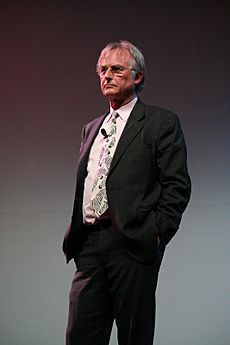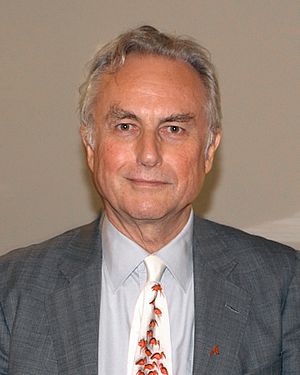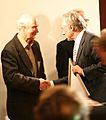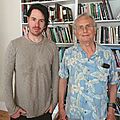Richard Dawkins facts for kids
Quick facts for kids
Richard Dawkins
FRS FRSL
|
|
|---|---|
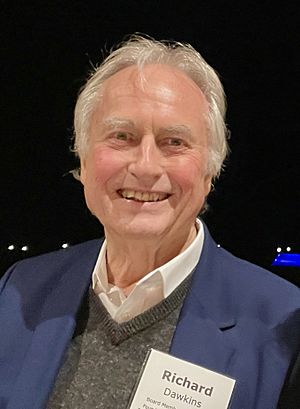
Dawkins in 2022
|
|
| Born |
Clinton Richard Dawkins
26 March 1941 Nairobi, then part of British Kenya
|
| Education | Oundle School Balliol College, Oxford (MA, DPhil) |
| Known for |
|
| Spouse(s) |
|
| Children | 1 |
| Awards |
|
| Scientific career | |
| Fields | Evolutionary biology |
| Institutions |
|
| Thesis | Selective pecking in the domestic chick (1967) |
| Doctoral advisor | Nikolaas Tinbergen |
| Signature | |
Richard Dawkins (born 26 March 1941) is a British evolutionary biologist, animal expert, and author. He is famous for his books about science and evolution. He taught at the University of Oxford for many years.
His 1976 book The Selfish Gene made the idea of a "gene-centred" view of evolution popular. This view suggests that evolution is best understood by looking at how genes survive. In this book, he also created the word meme to describe how ideas and cultural trends spread.
Dawkins is also a well-known atheist, meaning he does not believe in a god. He has written books like The Blind Watchmaker and The God Delusion that explain his views. In these books, he argues that science, especially evolution, provides a better explanation for the world than religion does.
Contents
Early Life and Education
Childhood
Richard Dawkins was born on 26 March 1941, in Nairobi, which was then part of British Kenya. His family moved back to England in 1949 when he was eight years old. His parents were very interested in science and always answered his questions with scientific explanations.
Dawkins grew up in an Anglican (Church of England) family. However, during his teenage years, he began to doubt his religious beliefs. He felt that the theory of evolution was a much better way to explain the complexity of life. This led him to stop believing in God.
University Studies
From 1954 to 1959, Dawkins attended Oundle School in England. He then went to Balliol College, Oxford, to study zoology, which is the study of animals. His tutor was Nikolaas Tinbergen, who later won a Nobel Prize for his work on animal behaviour.
After graduating in 1962, Dawkins continued his studies at Oxford with Tinbergen. He earned his DPhil (a type of doctorate degree) in 1966. His research was about how animals make decisions.
Career as a Scientist and Teacher
From 1967 to 1969, Dawkins was an assistant professor of zoology at the University of California, Berkeley. He then returned to the University of Oxford in 1970 as a lecturer.
In 1995, he became Oxford's first Professor for the Public Understanding of Science. This job was created for a scientist who could explain science clearly to everyone, not just other scientists. He held this position until he retired in 2008.
Dawkins has given many famous lectures and has appeared in TV shows about science. In 1991, he gave the Royal Institution Christmas Lectures for Children, a special series of talks for young people.
Main Ideas and Work
The Selfish Gene and Evolution
Dawkins is most famous for his ideas about evolution. In his book The Selfish Gene, he explained that we should think of evolution from the point of view of genes. Genes are the tiny units of DNA that are passed down from parents to children.
He argued that genes act "selfishly" because their main "goal" is to make copies of themselves. Organisms, like animals and people, are "survival machines" that genes build to help them survive and reproduce. This idea is called the gene-centred view of evolution.
Another important idea from Dawkins is the "extended phenotype." He explained that a gene's effects are not just limited to an organism's body. For example, a beaver's dam is part of its extended phenotype because the dam is built as a result of the beaver's genes.
The Concept of the Meme
In The Selfish Gene, Dawkins also introduced the word meme. A meme is a unit of culture, like an idea, a tune, or a fashion trend. He suggested that memes spread from person to person, similar to how genes spread from parent to child.
Just like genes, memes can change and evolve. Some ideas become very popular and spread quickly, while others die out. The study of how memes spread is called memetics.
Views on Religion
Dawkins is one of the world's most famous atheists. He argues that the existence of a god is a scientific question that can be investigated. He believes there is no evidence for a god and that religious faith is belief without evidence.
In his 2006 book, The God Delusion, he argues that a supernatural creator almost certainly does not exist. The book became a bestseller and was very influential in a movement called "New Atheism".
Dawkins believes that education is the best way to challenge religious beliefs that he sees as harmful. He supports teaching children to think critically, ask for evidence, and be skeptical.
Criticizing Creationism
Dawkins is a strong critic of creationism. Creationism is the belief that the universe and life were created by a god, not through evolution. He argues that evolution is a fact, supported by huge amounts of scientific evidence.
His 1986 book, The Blind Watchmaker, is a detailed argument against the idea of a divine designer. He explains that the complexity of life can be explained by natural selection. He calls natural selection a "blind watchmaker" because it creates complex designs without any plan or purpose.
Political and Social Views
Dawkins is a supporter of many humanist and secular groups. These groups believe that people can be good and live ethical lives without religion. He has encouraged atheists to be open about their beliefs.
He has also expressed his views on other topics. He is concerned about human overpopulation and supports animal rights. He has also spoken out against pseudoscience and alternative medicine, arguing that people should rely on treatments that are proven to work.
Over the years, some of his comments on social issues have caused controversy. In 2021, the American Humanist Association withdrew an award they had given him in 1996 because of comments he made that were seen as insensitive.
Personal Life
Dawkins has been married four times and has one daughter. In 2016, he had a minor stroke but has since recovered. He lives in Oxford, England.
Selected Books and Films
Books
- The Selfish Gene (1976)
- The Extended Phenotype (1982)
- The Blind Watchmaker (1986)
- Unweaving the Rainbow (1998)
- A Devil's Chaplain (2003)
- The God Delusion (2006)
- The Greatest Show on Earth: The Evidence for Evolution (2009)
- An Appetite for Wonder (2013) - His first book of memoirs.
- Brief Candle in the Dark (2015) - His second book of memoirs.
Documentary Films
- The Blind Watchmaker (1987)
- Growing Up in the Universe (1991)
- The Root of All Evil? (2006)
- The Enemies of Reason (2007)
- The Genius of Charles Darwin (2008)
- ..., Death and the Meaning of Life (2012)
- The Unbelievers (2013)
Images for kids
See also
 In Spanish: Richard Dawkins para niños
In Spanish: Richard Dawkins para niños
 | Selma Burke |
 | Pauline Powell Burns |
 | Frederick J. Brown |
 | Robert Blackburn |



